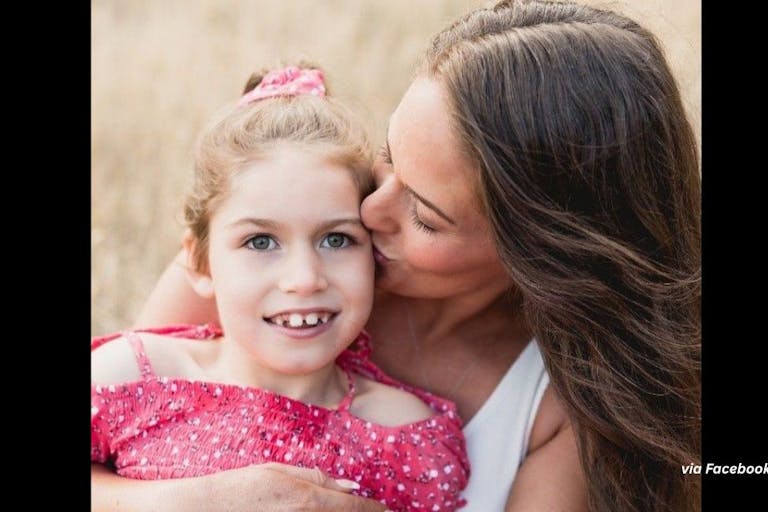
Texas library can keep sexually explicit material from minors... for now
Sheena Rodriguez
·
Human Interest·By Nancy Flanders
British Columbia ends child’s lifesaving treatment over cost: ‘Like a euthanasia sentence’
The parents of a young girl with Batten disease say they are “cautiously optimistic” that the British Columbia government will restore funding for their daughter’s drug treatment that slows the progress of her genetic health condition.
In June, the government pulled funding for the drug for nine-year-old Charleigh Pollock, who is the only person in the province that uses the medication — and whose doctors say she continues to benefit from it.
Charleigh Pollock has Batten disease, a rare condition that is considered terminal.
After her diagnosis at age three, the British Columbia province where she resides approved Brineura, a $1 million per year drug to slow progression of the disease.
Now a committee has determined that based on previously set criteria, Charleigh is no longer eligible for the drug and no longer benefits from it. However, her doctors say otherwise.
Charleigh’s parents and other advocates will meet with the health minister on Friday July 4, and her family hopes the funding for the drug will be reinstated.
Charleigh has neuronal ceroid lipofuscinosis type 2, also known as CLN2 or Batten disease, a rare condition that is considered terminal. It causes multiple seizures every day, which ultimately lead to brain damage. After six years on the new medication Brineura, the province is now denying it for Charleigh.
Her mother, Jori Fales, said the family is meeting with B.C. Health Minister Josie Osborne on Friday to discuss the situation. “I am cautiously optimistic but we have been disappointed twice now,” said Fales.
According to Osborne, once a patient with Batten disease has declined to a previously determined level in their motor and language function, Brineura is no longer effective at slowing the progression of Batten disease. Last year, the province determined that Charleigh’s condition had progressed to that point and that she “met the discontinuation criteria for Brineura,” said Osborne.
“I know this is not what Charleigh’s family wanted to hear. It’s not what any of us wanted to hear,” she added.
MSN reported that the decision to cover drugs for patients under the province’s Expensive Drugs for Rare Diseases program are made based on the recommendations of a committee of independent experts that use clinical criteria from Canada’s Drug Agency. The program covers about 30 drugs and has never provided coverage against the committee’s advice.
However, Charleigh’s medical team maintains that the medication is still in her best interest because it has improved her quality of life and greatly relieved her symptoms, including eliminating her seizures. Her last infusion was June 19 and she was denied the one previously scheduled for last week. Her parents hope to convince Osborne to restore funding.
“Anything less is simply cruel and wrong,” Fales wrote on Facebook.
“It is not Charleigh’s time to discontinue Brineura,” she added. “She is still benefiting, and we implore the province to allow her to continue living and accessing this drug.”
Also attending the meeting with Osborne on Friday will be neuroscientist Dr. Ineka Whiteman, an expert in Batten disease, Lori Brown, president of the Canadian Batten Disease Support and Research Association, and Andrew McFadyen of the Issac Foundation, who was the one to originally bring Brineura into British Columbia and advocated for the criteria for taking the drug.
Article continues below
Dear Reader,
Have you ever wanted to share the miracle of human development with little ones? Live Action is proud to present the "Baby Olivia" board book, which presents the content of Live Action's "Baby Olivia" fetal development video in a fun, new format. It's perfect for helping little minds understand the complex and beautiful process of human development in the womb.
Receive our brand new Baby Olivia board book when you give a one-time gift of $30 or more (or begin a new monthly gift of $15 or more).
Whiteman, who is traveling from New Zealand for the meeting, said that while Osborne said the decision to cut funding for the drug is not about money, she “frankly [doesn’t] know what else it could be about.” In addition, she noted that even the Drug Agency’s own report states that “evidence is limited regarding advanced disease and when to stop treatment.”
“It’s effectively like a euthanasia sentence at this point, taking away the treatment she is still benefiting from,” said Whiteman.
In 2019, Charleigh made headlines after the province announced it would cover Brineura for her, at the cost of $1 million a year. She was three years old at the time and had been diagnosed just three weeks prior. At the time, her father, Trevor Pollock, said, “This is the first step in a long journey ahead for our family.”
Patients with Batten disease are missing an enzyme, and Brineura, administered every two weeks, helps to replace that enzyme. It is given through an infusion of fluid to the brain to slow the progression of Batten, for which there is currently no cure. Charleigh’s parents hoped it would slow her deterioration until a cure could be found. If the disease continues progressing, Charleigh will go blind, develop dementia, and lose all cognitive function.
Children with the condition typically don’t live beyond age 12, but Brineura offers hope.
As Whiteman explained, revoking access to Brineura is “effectively like a euthanasia sentence” for Charleigh.
Canada has continued to become a nation that promotes death, with no limits on abortion and an ever-expanding assisted suicide and euthanasia program, Medical Assistance in Dying (MAiD).
Doctors in Canada have said they face pressure from the Canadian government to offer MAiD in order to cut costs for its underfunded national healthcare system. In 2020, Canada’s Parliamentary Budget Officer publicly released a report that its MAiD program (read: intentionally killing people) has created a “net cost reduction” of $86.9 million per year. Not stopping there, it noted that expansion of the categories of persons eligible for MAiD would create an additional net savings of $62 million per year.
The ideology that some individuals — namely those with chronic health conditions and disabilities — should die because a doctor said so is eugenic and immoral. Its wide acceptance in Canadian society causes discrimination against any and all individuals who don’t meet certain social and health “criteria” and are therefore deemed unworthy of life. But one person’s idea of a high quality of life is not the same as another’s and no government agency should be determining who gets proper medical care and who doesn’t.
By ending life-extending treatment for Charleigh against her doctors’ advice and the wishes of her family, the government of British Columbia has determined that it does not believe Charleigh’s life is worth fighting for.
Live Action News is pro-life news and commentary from a pro-life perspective.
Contact editor@liveaction.org for questions, corrections, or if you are seeking permission to reprint any Live Action News content.
Guest Articles: To submit a guest article to Live Action News, email editor@liveaction.org with an attached Word document of 800-1000 words. Please also attach any photos relevant to your submission if applicable. If your submission is accepted for publication, you will be notified within three weeks. Guest articles are not compensated (see our Open License Agreement). Thank you for your interest in Live Action News!

Sheena Rodriguez
·
Human Interest
Nancy Flanders
·
Human Interest
Nancy Flanders
·
Human Interest
Nancy Flanders
·
Pop Culture
Cassy Cooke
·
Human Interest
Cassy Cooke
·
Human Interest
Nancy Flanders
·
Investigative
Nancy Flanders
·
Pop Culture
Nancy Flanders
·
Human Interest
Nancy Flanders
·
Human Interest
Nancy Flanders
·